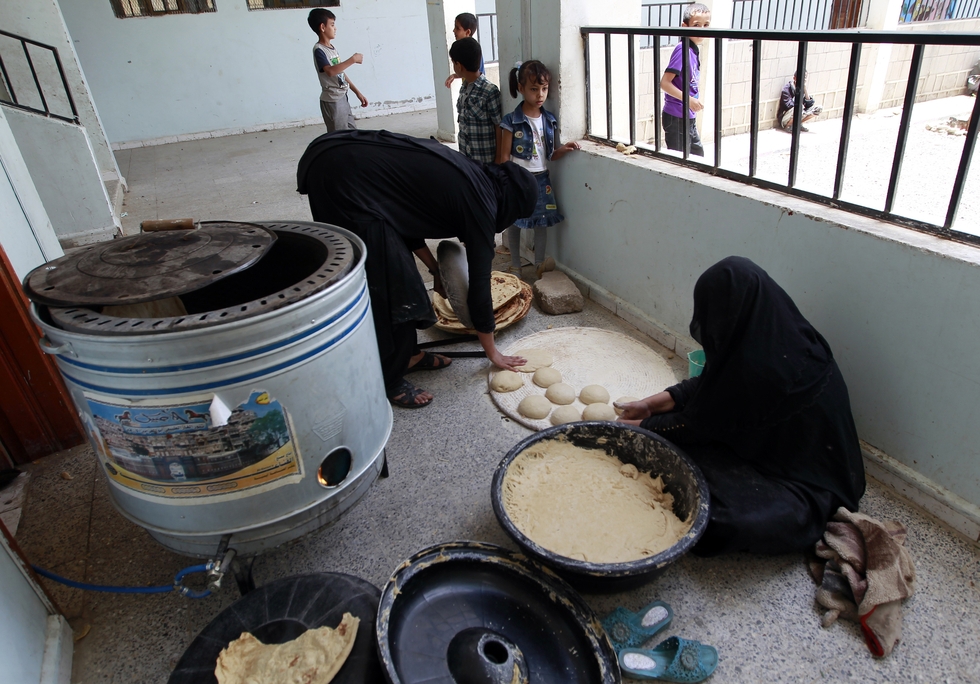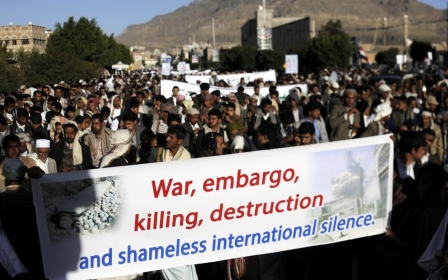The world must save Yemen from this man-made famine

“I wish there is no war in Yemen. I wish that we have electricity and water back and that we live happily. And that we eat until we are full.”
So says a 10-year old Yemeni kid, reflecting on his dreams of a return to peace in war-ravaged Yemen, a conflict that is pushing millions of people into famine, with 320,000 of children already facing severe malnutrition. Despite the lack of specific figures, reports show that a lot of children were born and died during the ongoing conflict due to the collapsing health system and severe malnutrition.
Eighteen months of war has certainly plunged the already impoverished country beyond destitution. The severe impact of the war was well-described last year by Red Cross chief, Peter Maurer, who wrote that, “Yemen after five months looks like Syria after five years.” The scale of devastation is on the rise by the day; there’s a type of death in Yemen which is unmeasurable, since if the bullets and shelling don’t kill you, the lack of food, water and medicine will. I lost count of my relatives, friends and friends’ relatives who have died in the wake of the catastrophic humanitarian situation. In light of Yemen’s failed peace talks and the early warnings of Yemen slipping into famine, Yemenis are unsurprisingly hungry both for food and peace.
Food as a weapon of war
Just as wars are never a coincidence, neither is hunger - it’s man-made. Hunger was already prevalent in Yemen long before war erupted in March 2015. Yemen had been in a state of chronic food insecurity for years, ranking near the bottom of the Human Development Index, while ousted President Ali Abdullah Saleh was piling up his wealth in billions.
Yemen’s 2011 uprising caused the economy to decline. Besides corruption, social inequality and unequal distribution of national wealth, progress in economic and social development over recent years has been slow, mainly as a result of the political crisis, ongoing instability and weak governance, as the UN Food and Agricultural Organisation pointed out in 2014.
Today, the situation has been tremendously exacerbated by the ongoing conflict. Among the many drivers for hunger in Yemen are fuel shortages and import restrictions which have reduced the availability of essential food commodities in the country, which overwhelmingly relies on the import of some 90 percent of its staple foods, as pointed out by World Food Programme.
The most crucial factor causing hunger in Yemen, though, is that all warring parties have used food as a weapon of war. The Saudi-led coalition has been imposing a blockade of Yemen’s main ports, jeopardising the survival of millions of Yemenis who are in urgent need of imported fuel, food, medicine and other commodities. When humanitarian aid agencies exert efforts to provide assistance, the Saudis dictates that any humanitarian operation to be conducted in Yemen must be barred from delivery to Houthi-controlled areas, according to a UN reporter.
Moreover, the coalition has bombed several bridges used to transport 90 percent of UN food supply in the country. At the same time, the Houthi-Saleh forces have also used food as a weapon in areas they are contesting, currently in Taiz and formerly in Aden, where it has been impossible for residents to have access to water, fuel, and food supplies while being besieged. Consequently, a black market emerged with skyrocketing prices for rare commodities only few can afford to purchase.
With that said, deprivation and starvation are the common norm in Yemen today. Before the war, the World Bank estimated that 50 percent of Yemen’s population were under the poverty line, while today it estimates that figure has rocketed to 80 percent of the population.
Stop the famine
These shocking statistics warn that Yemenis soon will be put to death by starvation, as the war has no end in sight. As long the world remains indifferent and timely action to prevent it is not taken, all indicators show a famine is all but inevitable.
As a human rights issues blogger, nothing I have witnessed in Yemen’s human rights situation cuts me as painfully deep as witnessing my country slipping into mass hunger. I strongly believe hunger is the gravest human rights abuse in Yemen. And how shameful it is that a famine is unfolding here in a region surrounded by some of the world’s richest countries.
The expected famine must be stopped before it sweeps the country. Report after report shows people’s accounts of starvation and suffering. What is the world waiting for, I wonder: till Yemenis’ bodies pile up with nobody strong enough to dig the graves?
Famine can be mitigated if more humanitarian and diplomatic action is taken by the international community. Yemen needs the world’s solidarity to stop the looming famine that could become a cause of shame to the global humanitarian system with irreversible consequences for Yemen's 28 million population.
- Afrah Nasser is a multi-award winning Yemeni freelance writer and blogger focusing on human rights violations, based in Sweden since May 2011. She blogs at: afrahnasser.blogspost.com.
The views expressed in this article belong to the author and do not necessarily reflect the editorial policy of Middle East Eye.
Photo: Displaced Yemeni women, who fled Saada province due to fighting between Shiite Huthi rebels and forces loyal to Yemen's exiled President Abedrabbo Mansour Hadi, make bread at a school turned into a shelter in the capital Sanaa on August 19, 2015. The United Nations warned of a "developing famine" in Yemen, where more than half a million children are severely malnourished, and pressed for access to its war-torn regions. (AFP)
New MEE newsletter: Jerusalem Dispatch
Sign up to get the latest insights and analysis on Israel-Palestine, alongside Turkey Unpacked and other MEE newsletters
Middle East Eye delivers independent and unrivalled coverage and analysis of the Middle East, North Africa and beyond. To learn more about republishing this content and the associated fees, please fill out this form. More about MEE can be found here.





